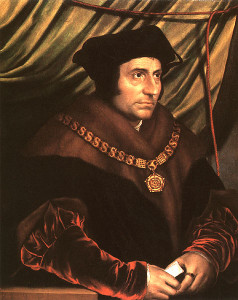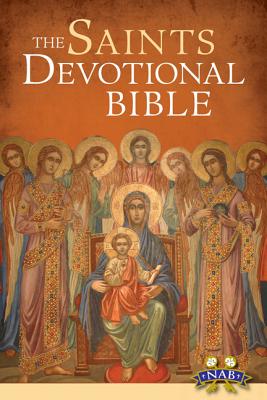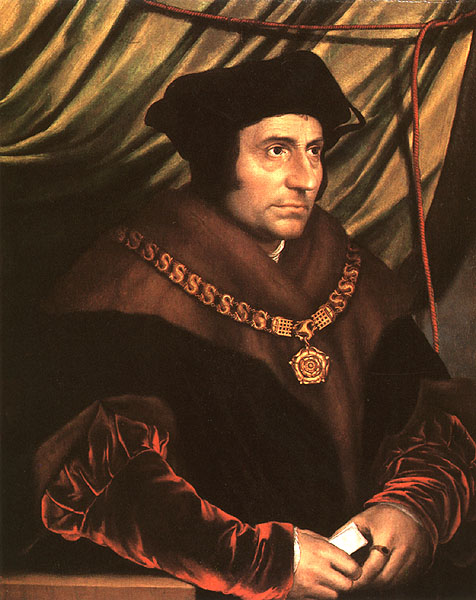Today we continue our regular series called “Learning from the Saints.” Our guide is expert Bert Ghezzi, a dear friend of mine and the author of numerous books including Voices of the Saints, Saints at Heart, and Discover Christ: Developing a Personal Relationship with Jesus.
His newest book is The Saints Devotional Bible, which illuminates the Scriptures with the saints’ own reflections. You can learn more about Bert and his work at BertGhezzi.com.
Today, Bert profiles St. Thomas More, the patron of lawyers, statesmen, politicians, and large families.
“When fierce temptations threat thy soul with loss
Think on his passion and the bitter pain,
Think on the mortal anguish of the cross,
Think on Christ’s blood let out at every vein,
Think of his precious heart all rent in twain;
For thy redemption think all this was wrought,
Nor be that lost which he so dearly bought.”
— Thomas More
Thomas More is one of the most popular saints, perhaps because, like most of us, he was a lay person. He was a family man, happily married with four children. The saint led a lively household where both famous scholars and poor neighbors were always welcome. More was a barrister, a member of parliament, an officer in local government and finally after 1529, Lord Chancellor of England The saint was also a world-renowned Renaissance scholar whose best remembered work, Utopia, appeared in 1516.
 We are comfortable with More because, like us, every morning, he had to relate to several teenagers, see to paying a bill, talk to his wife about dinner plans and see a guest off. Then he spent long days with little leisure tending to the duties of government and to writing. So we admire Thomas More for demonstrating that a person locked into the daily grind–like you and me—can become a saint.
We are comfortable with More because, like us, every morning, he had to relate to several teenagers, see to paying a bill, talk to his wife about dinner plans and see a guest off. Then he spent long days with little leisure tending to the duties of government and to writing. So we admire Thomas More for demonstrating that a person locked into the daily grind–like you and me—can become a saint.
More was devoted to the crucified Christ. Often on Fridays he knelt for hours before a crucifix, meditating on the Lord’s passion. To imitate Christ’s suffering, he always wore a hair shirt hid beneath his clothes and sometimes he scourged himself. We may be relieved that More only advises us to “think on” the cross and not to use his own severe penances.
Thomas More made his way through Renaissance politics with flawless integrity, until it occasioned his martyrdom. When King Henry VIII decided to divorce his wife and declare himself head of the Church in England, More opposed him. But he scrupulously obeyed the law, never speaking of “the King’s great matter.” However, when Henry required an oath of support, More refused. The king’s cronies arrested him, and left him to languish in prison.
More’s words and behavior in the face of death may help us approach our death more peacefully. From prison he wrote Margaret, his eldest daughter, “Nothing can come but what God allows. And I am very sure that whatever that be, however bad it might seem, it shall indeed be the best.” He also told her he was thankful for his circumstances.. “I thank God, Meg, for I think God makes me a wanton and sets me on His lap and dandles me. He forgave the king’s men who condemned him to death.. I shall pray heartily, he said, “that though your lordships have now here on earth been judges of my condemnation, we may yet hereafter in heaven merrily all meet together to everlasting salvation.”
On July 6, 1535, Thomas More was beheaded. Before his death, he eloquently characterized his life by declaring that he was “the king’s good servant–but God’s first.”
On More’s way to the scaffold, a troubled man greeted him. Years before the fellow had was healed of mental illness when More had promised to keep him in his prayers. Now he feared that without More’s prayers he would relapse into severe depression. But More assured him that death would not stop his intercession. He said, “Go thy ways in peace, and pray for me, and I will not fail to pray for thee.” More evidently planned to stay busy in heaven.
(Image Credit: Tudor History)
Read more from Bert at his website www.BertGhezzi.com, or check out his many books on Amazon.
 |
 |
 |
 |


